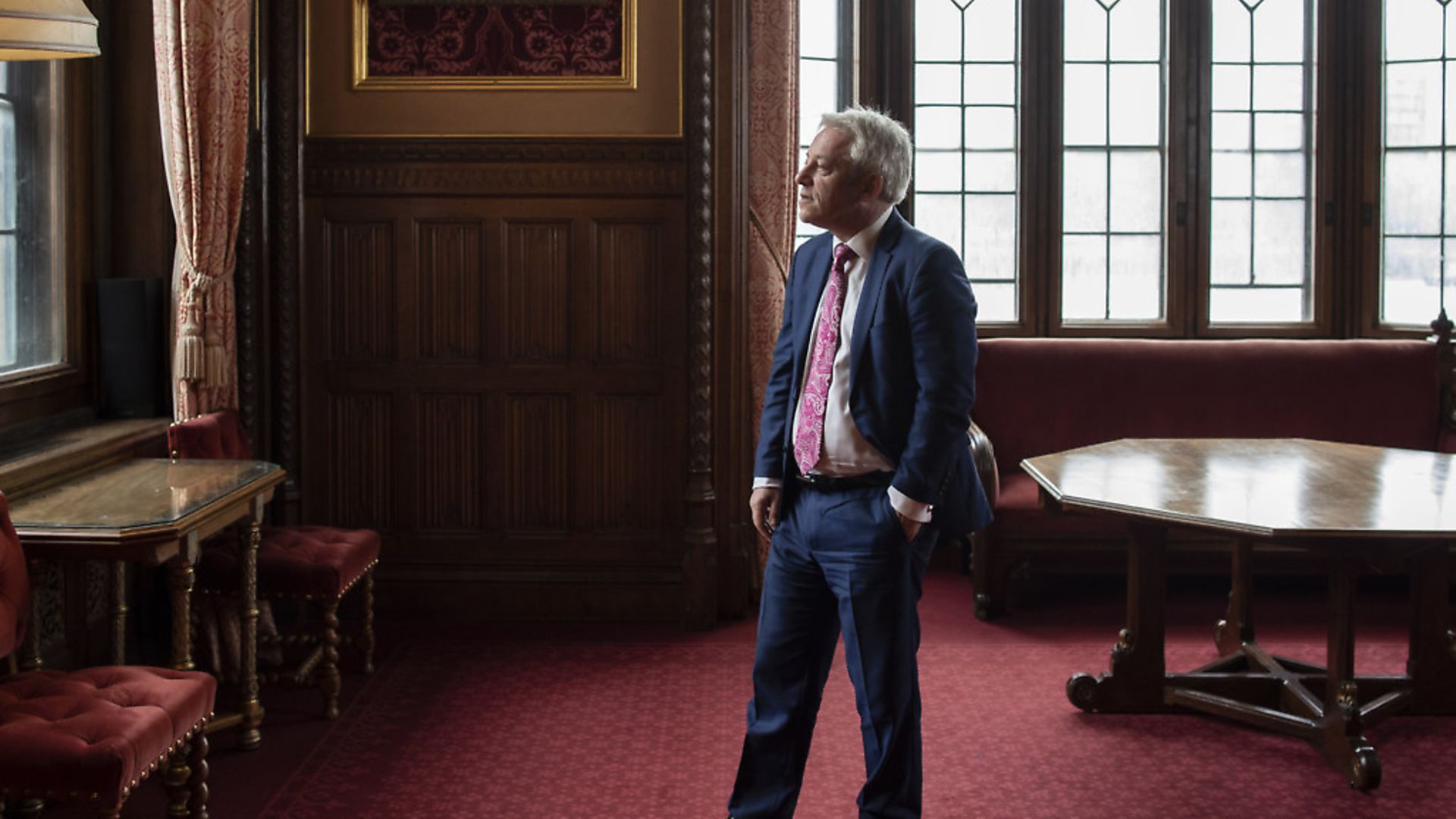
ZOE WILLIAMS on the pivotal role that John Bercow is destined to play this autumn to defend the constitution.
I spend a lot of time at the moment thinking about the English Civil War, for obvious reasons. The parallels are enough to make a person shake their head, and shout “Seriously? We really have to do this twice? REALLY?”
What started out as quite a narrow dispute within the ruling classes – the king fighting parliament, both sides pursuing what were essentially their own economic interests, with a side-order of unhelpful machismo – soon drew the whole country into violent discord, because it’s just not that easy, staying immune from the dramas of one’s elite, however vaudeville.
In the ensuing chaos, the worst rose to the top, and pretty soon we’d reached a place nobody ever wanted: Come on, guys. We might have thought the king needed a haircut, nobody wanted to cut his head off. Nobody voted to ban dancing bears. Nobody wanted to abolish Christmas.
Successive iterations of parliament – a rump, a parliament of saints – all failed because, once you’re in the grip of a really bad idea, no amount of discussing it makes it any better.
I wouldn’t want to draw out any similarity between Oliver Cromwell’s policy on Ireland and Boris Johnson’s, lest it give our current prime minister new ideas.
To take it to a more granular level, the role of the speaker became paramount as the Civil War kicked off, and remained so right the way through the regicide and into the rule of Cromwell.
Speakers are meant to be boring: they can’t vote; they stay impartial; tops, they’re allowed to make the odd joke.
Yet that neutrality is predicated on the idea that government and parliament are on the same side. When a ruler moves against his parliament (sorry, guys, but it always is a he), the speaker’s allegiance becomes clear.
“I have neither eyes to see nor tongue to speak in this place but as this House is pleased to direct me,” William Lenthall, speaker – give or take the odd hiatus – from 1640 to 1659 famously declared, when Charles I arrived to arrest his adversary, John Pym.
Arguably, had the King been able to arrest those rebels, the Civil War wouldn’t have happened and the bears could have continued to dance. But that wasn’t and will never be the speaker’s call: he or she is there to defend parliamentary sovereignty.
John Bercow understands this perfectly well, and has already made that clear informally, at the Edinburgh Fringe over the summer: “The one thing I feel strongly about is that the House of Commons must have its way,” he said. “And if there is an attempt to circumvent, to bypass or – God forbid – to close down parliament, that is anathema to me. I will fight with every breath in my body to stop that happening. We cannot have a situation in which parliament is shut down. We are a democratic society and parliament will be heard.”
He has to rely on more, however, than the breath in his body; the will of the House determines the limits of what he can do.
In terms of proroguing parliament, or if you prefer, shutting down British democracy, the speaker isn’t on his own. There are legal moves happening in tandem, led by the QC Jo Maugham, and jointly submitted by 70 parliamentarians but happening in the courts rather than the Commons, so unrelated to parliamentary process.
It’s possible, without being a Pollyanna about it, to believe that on its own will suffice: As Maugham has said, courts are typically very reluctant to be dragged into political conflicts, but the starker the move, constitutionally, the less they have a choice.
The government’s rhetoric is becoming pretty graphic: to suspend parliament while they force through a no-deal Brexit would essentially be a putsch. It would be surprising if the rule of law had nothing to say to about its own abrogation.
Bercow, meanwhile, has the power of deciding what the House discusses: he is the gateway of any debate they have that is not brought forward by the government.
Processes have changed, in this regard, since 1642. The 2010 reforms introduced by MP Tony Wright’s select committee were intended to rebalance the relationship between parliament and the executive; they suggested a set of new processes which would allow the House more say in what was discussed and when.
The Backbench Business Committee – which allowed a committee of backbenchers to bring an agenda forward, which the speaker would then facilitate or not – was passed. The other suggestion – a House Business Committee, in which government and backbenchers together would decide – was quietly dropped by David Cameron, despite his having agreed to it while in opposition.
The point is not to settle old scores with Trotters, which could take all day: rather, there is nothing revolutionary or outlandish in the idea of parliament having a say in what parliament discusses. There is a well established doctrine that parliament should be moving towards being able to operate not just at the behest of the government.
Even while that House Business Committee never materialised, the Backbench Business Committee did, and has never been more important. It’s been used to concrete beneficial effect before – this was how Harriet Harman and Maria Miller pushed forward proxy voting for ‘baby leave’, which peculiarly never struck the government as warranting parliamentary time. But our circumstances are quite novel: the government will be actively seeking to block two key debates: one on no-deal as a decision; the other on extending Article 50 so that we don’t slide inexorably into it.
For Bercow to schedule these debates – which would be brought as SO24s (Standing Order No. 24) – he would need to be convinced that there was a parliamentary majority to have them at all.
If a backbencher brings a bill to instruct Boris Johnson not to go ahead with no-deal, it is not for the speaker to adjudicate whether or not that bill will pass. But he does have to be confident that there are more than three people who want to talk about it, otherwise he will struggle to argue that he’s acting on parliament’s will.
We can say with relative certainty that there is a parliamentary majority to stop itself being prorogued; very few MPs outside the cabinet have any enthusiasm for such a radical move. We could say on the basis of the votes in spring that there is a majority ranged against a no-deal Brexit under any circumstances: that majority was nail-bitingly small (312 to 308 votes, though that margin went up to 43 in a subsequent vote), but in volatile times, any majority counts – as Theresa May famously calculated, all you need to win by in a vote of no confidence is one.
If we’re relying on parliamentarians to follow positions to their logical conclusion, which is some if, we could therefore say that there’s a majority for extending Article 50. Certainly, nobody could critique the speaker for want of impartiality, were he to allow time for these debates.
The speaker could not disallow a vote of no confidence from the opposition, nor would he be in a position to decide between one caretaker prime minister and another. All those decisions would be with parliamentarians. Were Johnson to refuse to stand down, having lost a vote of no confidence, another bizarre and unconstitutional suggestion that was floating out of his camp a month ago, we would land in a similar spot to the prorogation debate.
When so much is determined by convention, the task of resisting a coup does not obviously land on any one individual or role or even institution – simply because coups are mercifully rare in British politics and those conventions are not established.
However, Bercow’s commitment to parliamentary sovereignty is not in doubt. His route to resisting an overweening executive is straightforward. The government cannot block a debate that Bercow has allowed.
What remains in the balance is the ability of parliamentary opposition – to no-deal, to a bad deal, to leaving the EU at all – to hone itself to the point where it brings bills to the speaker that have enough unified support to justify his intervention.










